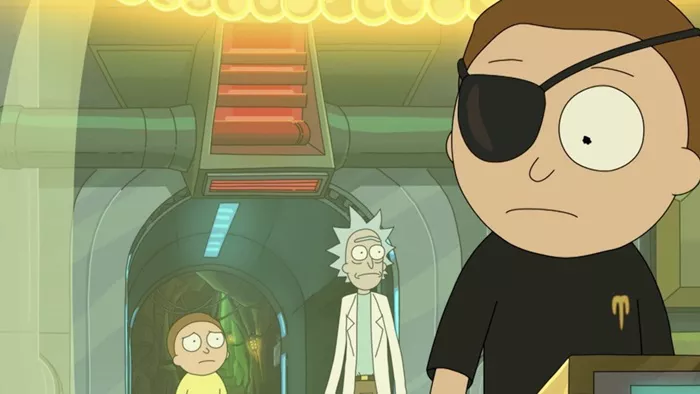In the realm of fiction, character development often takes unexpected turns, challenging audience perceptions and moral boundaries. One such intriguing transformation is that of Morty, a character initially depicted as innocent and morally grounded, into a figure of evil. This evolution raises profound questions about the nature of morality, the influence of circumstances, and the complexities of character development in storytelling.
Morty’s Journey
Morty, originally introduced as a typical teenage boy in a seemingly ordinary suburban setting, undergoes a gradual transformation throughout his narrative arc. Initially portrayed as the reluctant sidekick to his adventurous grandfather, Rick, Morty’s character development takes a significant and unexpected turn as he navigates through various challenges and ethical dilemmas.
The Seeds of Change: Early Signs of Moral Ambiguity
The seeds of Morty’s transformation can be traced back to early episodes where he is exposed to the harsh realities of the multiverse. In these instances, Morty is often forced to confront difficult decisions that blur the lines between right and wrong. His exposure to Rick’s amoral and often self-serving behavior begins to erode his innocence and idealism, planting the seeds of moral ambiguity within him.
The Influence of External Factors
External factors play a pivotal role in Morty’s evolution towards evil. Throughout the series, Morty encounters a range of characters and situations that challenge his moral compass. Whether it’s the manipulative schemes of intergalactic villains or the consequences of his own actions, each experience leaves an indelible mark on Morty’s psyche, pushing him further down a path of moral compromise.
The Corrupting Influence of Power
Power dynamics also contribute significantly to Morty’s descent into darkness. As Morty gains more knowledge and agency within the multiverse, he becomes increasingly aware of his ability to influence events and outcomes. This newfound power proves to be intoxicating, tempting Morty to embrace his darker impulses in pursuit of his goals, regardless of the ethical implications.
Psychological and Emotional Factors
Beyond external influences, Morty’s internal struggles and emotional vulnerabilities play a crucial role in his transformation. The series explores Morty’s complex psyche, delving into his fears, insecurities, and desires. These inner conflicts often manifest in destructive ways, driving Morty to make morally questionable choices that serve his own interests at the expense of others.
See Also: when does aizen die
Breaking Bad: The Point of No Return
The pivotal moment in Morty’s transformation into evil often marks a point of no return, where he crosses a moral threshold with irreversible consequences. This turning point is characterized by a significant act of betrayal, violence, or moral compromise that fundamentally alters Morty’s character trajectory and establishes him as a morally ambiguous or outright malevolent figure.
Justification and Rationalization
As Morty’s journey progresses, he increasingly justifies his actions through a distorted moral lens. What begins as a quest for survival or self-preservation evolves into a justification for increasingly unethical behavior. This process of rationalization serves to distance Morty from his original moral compass, allowing him to commit acts that would have been unthinkable at the outset of his journey.
The Ripple Effect: Impact on Relationships and the Narrative
The transformation of Morty into evil inevitably has profound implications for his relationships with other characters and the overall narrative arc. Friends and allies may become estranged or disillusioned as Morty’s moral descent becomes more pronounced. Conversely, Morty’s evolution challenges the audience’s perception of morality within the narrative, blurring the lines between protagonist and antagonist.
The Inevitable Confrontation: Facing the Consequences
Ultimately, Morty’s journey towards evil culminates in a confrontation where he must face the consequences of his actions. This pivotal moment serves as a catharsis for both Morty and the audience, forcing a reckoning with the moral implications of his transformation. Whether Morty achieves redemption, succumbs to his darker impulses, or faces a more ambiguous fate, the resolution of his character arc leaves a lasting impression on the narrative and its themes.
Conclusion: Morty’s Evolution in Context
In conclusion, Morty’s transformation into evil represents a compelling exploration of moral ambiguity and character development within storytelling. From his humble beginnings as a naive teenager to his evolution into a complex and morally compromised figure, Morty’s journey challenges traditional narratives of heroism and villainy. By examining the influences, psychological factors, and pivotal moments that shape Morty’s character arc, we gain insight into the complexities of morality, power dynamics, and the human condition as portrayed through fiction.
As audiences continue to dissect Morty’s evolution and its implications, one thing remains clear: his transformation into evil serves as a poignant reminder of the nuanced nature of character development and the enduring impact of storytelling on our understanding of morality.

